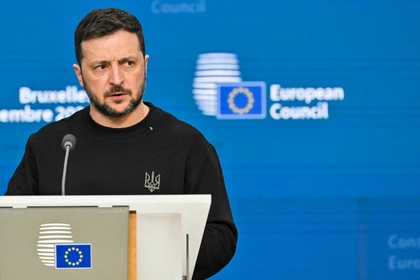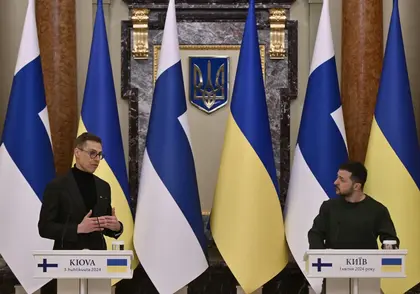Russia is preparing to deploy an additional 300,000 troops to Ukraine by June 1, Ukraine's President Volodymyr Zelensky said in a joint press conference with his Finnish counterpart Alexander Stubb, as reported by RBC-Ukraine.
“We don't need half a million. The corresponding number that was not at the front - they will be at the front. As for the exact number, I am not ready to say how many will be mobilized,” Zelensky said.
JOIN US ON TELEGRAM
Follow our coverage of the war on the @Kyivpost_official.
“I can say that Russia is preparing to mobilize an additional 300,000 troops on June 1," he added.
British intelligence sources indicate that Russia's ongoing recruitment drive, is enlisting approximately 30,000 new soldiers monthly.
In late March, Russian President Vladimir Putin signed the decree for the annual spring conscription, aiming to draft 150,000 soldiers into the Russian army. Although the Kremlin has said that conscripts would not be sent to Ukraine, in line with existing legislation, this promise has not been kept in the past. It is likely, therefore, that many of the 2024 intake will join Russia’s forces carrying out the ongoing Ukraine invasion.
According to Andrii Kharuk, a professor at Hetman Petro Sahaidachnyi National Ground Forces Academy, conscripts can be pressured or forced to sign contracts with the Russian army to make them eligible to be sent to the front line.
“They will put pressure on these young guys. And after signing the contracts they can be used as ‘gun meat.’ But not many of them are going to do this because even in the Russian regions people already know how bloody the war is here, so I think they will get about 20-25 percent of conscripts to sign contracts,” Kharuk told Kyiv Post.

Zelensky Says Trump and EU Must Work Together to Secure Peace
Russia is testing out new mobilization systems, including electronic summons Ukrainian analyst and serviceman Illya Krotenko wrote on his Facebook.
Krotenko wrote: “If the conscript ignores it for seven days, he becomes a criminal with all the penalties – such as fines, sanctions on operations with real estate, prohibition from holding a driver's license, etc.”
Ukraine's Military Intelligence earlier suggested that the recent Islamic State terrorist attack on the Crocus City Hall shopping center near Moscow, where 144 people died and which the Kremlin has attempted to pin on Ukraine, will be exploited by the regime to bolster its mobilization efforts.
Following the Kremlin's accusation of Kyiv’s involvement, which was made without declaring any evidence, the Russian Ministry of Defense claimed Wednesday that more Russians are reportedly signing military contracts to fight in Ukraine in order to “avenge” those killed in the Islamic State’s Moscow attack.
“In Moscow and other Russian cities, the number of people willing to enlist in the Russian Armed Forces under contract has significantly increased,” the Russian Defense Ministry posted on Telegram, on April 3.
It claimed that over the past 10 days, about 16,000 citizens have signed contracts to participate in the so-called “special military operation” – the term the Kremlin uses to refer to its war in Ukraine – adding that “up to 1,700 people come to contract recruitment centers across the country every day to enlist in the military.”
Meanwhile, in a bid to address Ukraine's urgent need for additional troops, Ukrainian President Volodymyr Zelensky has approved a law to lower the army mobilization age from 27 to 25, almost a year after it was approved by parliament.
Zelensky said in December the army wanted to mobilize up to half a million people to battle Moscow's forces in Ukraine.
In February, the Verkhovna Rada, Ukraine’s parliament endorsed a bill aimed at facilitating the enlistment of more soldiers into the armed forces.
The new mobilization draft law is intended to address mobilization issues. It passed its first reading on Feb. 12, which allowed amendments to be made to it. After the amendments are considered, it will be voted on a second time after which it will become law (or not).
However, some 4,300 amendments, most of them proposed by President Volodymyr Zelensky’s Servant of the People party, have been put forward and are holding up the process.
You can read more on the pending mobilization issues in Ukraine here.
You can also highlight the text and press Ctrl + Enter






